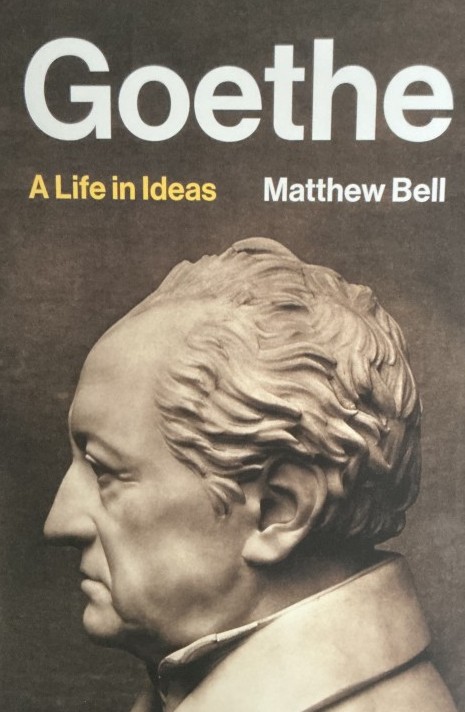Inspiring Older Readers
 posted on 02 Sep 2025
posted on 02 Sep 2025
Goethe: A Life in Ideas by Matthew Bell
I feel that I need to start this review with a confession: I’ve always found Johann Wolfgang von Goethe an intimidating and largely unapproachable figure. Somehow, I’d developed an image of the man that was dour and almost stereotypically Germanic, a man who represented a sort of northern European aestheticism. I suspect that the popular portraits of him, not dissimilar to that shown on the jacket of this book, had a big part to play in creating that picture in my mind.
As a young man at university, I had a copy of the Penguin Classics edition of Faust but I can’t in all honesty promise that I read it – I may have done but I have no memory of doing so. Nonetheless, it’s a text that’s always been on my shelf in one guise or another because somehow I felt it was something I should know about – a classic of European literature that helped shape modern literary tastes and ideas.
When I was offered the chance to review Matthew Bell’s new book on Goethe I jumped at the chance: Bell, professor of German and comparative literature at King’s College London, should be the ideal person to break down the barriers for me and bring Goethe out of the shadows. And, I’m delighted to say, I wasn’t wrong.
Bell’s book is a monument to academic investigation – it’s huge in every sense and it’s a book which, if you’re at all interested in the subject matter, is one you aren’t going to read just once. It’s a resource to be mined over time and my inevitably rather slender review will only be able to skate on the surface.
This isn’t just another life of the man in the plodding biographical sense; rather, it’s a life of the man measured through his contribution to the ideas that shaped the post-Enlightenment landscape in Europe. Bell doesn’t neglect his big literary achievements but he’s eager to put them in context alongside the huge range of other ideas that Goethe was concerned with – philosophy, religion and politics are all central not just to his thinking but to his written output. But, Bell contends, it’s an intellectual legacy that has not been given its due weight and he uses this book to make that case.
What I found especially interesting is the fact that in many ways Goethe sits right at the heart of the intellectual maelstrom that engulfed Europe as it was grappling with its own Renaissance. Central to the debate that raged around him in 1760 when his writing career was taking off was the question of belief – was there a God at all and if there was, what is this God? And, what does this mean for ideas of the good society and the leadership and management of that society? Could there be a just and moral state without a belief in a ‘supernatural’ deity?
Bell is always eager to assert the range and scope of Goethe’s intellectual output and to emphasise the legacy he has left:
“Goethe’s cultural legacy is well known. His intellectual legacy has been no less important but less familiar. One indication of the power of his influence is that some of the major figures of the nineteenth and twentieth centuries built their intellectual careers around the reception of his ideas. Four examples are Matthew Arnold, Friedrich Nietzsche, Max Weber and Oswald Spengler.”
On first read for me however, the question Bell poses and which I think is most fascinating is the way Goethe has been embraced equally by both Liberal and Conservative political outlooks. There is plenty of evidence here that Goethe’s writings are those of a man with a developed Liberal social outlook and yet when we examine his record in the world of practical politics his preference is clearly for the authoritarian. It’s a dilemma Bell acknowledges head-on:
“One of the questions that has run through this book is how we might reconcile the constant liberality of Goethe’s poetic and intellectual career with the overwhelmingly anti-liberal tenor of his ministerial activity and political thought.”
He offers us some kind of solution, citing what he calls Goethe’s ‘unusual form of compromise’ – but I’m going to leave you to find out just what that compromise might be for yourselves as you explore Matthew Bell's remarkable work.
The book is published by Princeton University Press and you can get a copy from your local independent bookshop – who will be happy to order you a copy if they don’t have it on their shelves.
Terry Potter
August 2025